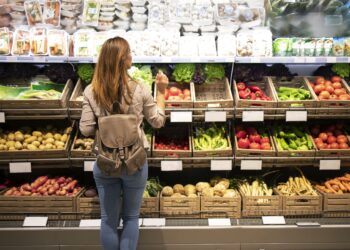Everyday shopping is full of English words that you can notice and use. Whether you stop by a bakery, a butcher shop, or a small market, you’re surrounded by simple vocabulary that’s part of real life. In this article, we’ll look at some food shops English terms to practice — easy words that can help you feel more comfortable when talking about food or visiting different stores.
It’s a friendly way to grow your vocabulary while thinking about situations you already know and live.
And don’t forget: at the end of the article, there’s a quick activity to help you remember everything you’ve learned!
Why Learn About Different Food Shops?
Each type of food store has its own name—and often, its own set of common products and words. When you learn these terms, you can:
- Ask for directions more clearly.
- Understand what kind of food is sold where.
- Practice real conversations with locals or fellow learners.
- Feel more confident during trips, shopping, or even watching cooking videos.
Many learners only study “supermarket” vocabulary, but daily life includes many other types of food shops. Knowing the difference between a deli and a butcher, or between a produce stand and a convenience store, makes your English more natural and complete.
Types of Food Shops and What You’ll Find There
Here’s a helpful guide to common food-related shops, what they sell, and useful words you might hear in each one:
1. Produce Shop / Produce Stand
This is where you buy fresh fruits and vegetables. Sometimes it’s part of a market, or a small store.
Common words:
- apples, bananas, lettuce, carrots, onions
- fresh, ripe, organic, in season
Sample phrase:
“Are these tomatoes organic?”
2. Bakery
A bakery sells bread, cakes, cookies, and pastries. Some bakeries also serve coffee or sandwiches.
Common words:
- loaf, baguette, muffin, pie, croissant
- fresh-baked, warm, sweet, whole grain
Sample phrase:
“I’ll take two muffins and a loaf of whole wheat bread.”
3. Supermarket
This is a large store where you can find almost everything — produce, meat, dairy, frozen food, canned goods, and household items.
Common words:
-
aisle, cart, checkout, cashier, on sale
Sample phrase:
“Where is the dairy section?”
4. Butcher Shop
A butcher sells meat—fresh or prepared. They may also help cut meat into specific sizes for cooking.
Common words:
- beef, pork, chicken, steak, ground meat, sausage
- fresh cut, boneless, lean
Sample phrase:
“Can I get half a kilo of ground beef, please?”
5. Fish Market
Here you’ll find fresh fish and seafood like shrimp, salmon, and squid. Some fish markets also clean and prepare the fish for you.
Common words:
- fillet, shrimp, squid, crab, fresh catch
- cleaned, frozen, wild, whole
Sample phrase:
“How much is the salmon per kilo?”
6. Deli (Delicatessen)
A deli offers cold cuts, cheese, prepared salads, and sandwiches. It’s great for quick meals or snacks.
Common words:
- ham, turkey, salami, cheddar, coleslaw
- sliced, smoked, spicy, mild
Sample phrase:
“Can I get 200 grams of sliced turkey and Swiss cheese?”
7. Convenience Store
A small shop with snacks, drinks, and basic foods. Often open late or 24/7.
Common words:
- bottled water, chips, soda, sandwich, candy
- grab-and-go, quick bite, late-night snack
Sample phrase:
“Do you sell milk or just snacks?”
Explore Your City
Even if you don’t live in an English-speaking country, you can use what you’ve learned in real life. Next time you walk past a bakery, produce shop, or butcher, try naming it in English. Look at the food items and think: “What is this called in English?”
You can also write a simple list of what you would buy at each store. For example:
- At the bakery: one croissant and two loaves of bread.
- At the deli: ham, cheddar cheese, and olives.
- At the supermarket: milk, eggs, rice, apples.
This kind of practice helps you remember and use the words naturally, without needing a classroom.
Food Shops in English
Knowing the names of different food shops — and what they sell — can really expand your vocabulary. These are places we visit often, and the words connected to them are useful in everyday life. With just a little practice, you’ll start to feel more comfortable using this vocabulary to ask questions, shop for food, or even describe your day.
Keep exploring new words, especially ones that match your routine. The more you connect English to your daily life, the faster it becomes part of your thinking.
This lesson on food shops English terms to practice is one more step in your journey. Keep going — you’re doing great!
Grammar Practice
To help you remember what you’ve learned, try answering these questions. These brief exercises are designed to gauge your understanding and get you thinking about the article’s key points. Take your time and assess your writing.
Rewrite the sentences, adding the words that are missing.
Writing Lessons
We need to buy ____ fresh fruit and ____ new vegetables at the produce stand today
(much / a lot of | many / a lot of)
I didn't see ____ organic carrots, but they had ____ beautiful ripe tomatoes
(any / some | some / any)
How ____ ground beef should I ask the butcher for?
(many / much)
There aren't ____ fish markets near my house, so I buy ____ fish at the supermarket
(much / most | many / most)
I bought ____ fresh-baked bread, ____ muffins, and ____ cold cuts at the deli
(two / much / some | much / some / three | much / a few / several)
Learn from Videos
Check out the video below for a little more practice. Try to understand the context or what is being said.
Vocabulary
| Word | Meaning |
|---|---|
| Produce | Fruits and vegetables |
| Baguette | A long, thin loaf of French bread |
| Checkout | The place where you pay for your items |
| Cold cuts | Pre-sliced meats like ham or salami |
| Fillet | A piece of meat or fish with no bones |
| Ground beef | Minced or finely chopped beef |
| Fresh catch | Fish or seafood caught recently |
| Convenience store | A small shop for snacks and basic groceries |
| Deli | A shop for meats, cheese, and ready-to-eat foods |
| On sale | Being sold at a lower price than usual |














